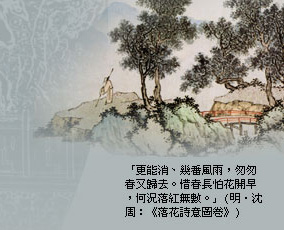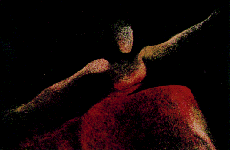钗頭鳳 陸遊 (1125-1210)
紅酥手 黃藤酒
滿城春色宮牆柳
東風惡 歡情薄
一懷愁緒 幾年離索
錯 錯 錯
春如舊 人空瘦
淚痕紅邑鲛绡透
桃花落 閑池閣
山盟雖在 錦書難托
莫 莫 莫
Tune: Phoenix Hairpin Lu You (1125-1210) 江紹倫譯
Tender hands fine
Well aged wine
In a spring-filled city willows confined
Harsh east winds
Happy feelings thin
My heart filled with misery
Yearnings years too long
Wrong Wrong Wrong
Spring like last year remains
I see you are so thin
Your red kerchief soaked with tears
Peach blossoms fall
By the deserted hall
Our love oaths still true
Messages could not get through
No No No
(We know very little about marriages in old times. They were ruled by parents for sure, but not entirely. Lu You divorced his dear wife Tang Wan by his mother’s demand. They met two years later when they were still very much in love. But they were already remarried by then. Those were days when poets were free to write poems on public walls, like graffiti’s today. Lu wrote the first poem. Tang saw it and wrote the second in reply.)
钗頭鳳 唐琬 (1124-1156)
世情薄 人情惡
雨送黃昏花易落
曉風乾 淚痕殘
欲箋心事 獨語斜闌
難 難 難
人成各 今非昨
病魂常似秋千索
角聲寒 夜闌珊
怕人尋問 咽淚妝歡
瞞 瞞 瞞
Tune: Phoenix Hairpin Tang Wan (1124-1156) 江紹倫譯
Fairness has worn thin
Relations belligerent
Rain-filled eves hasten flowers to fall
Morning breezes fuss
Traces of tears fade
I wish to write you my feelings
Only to lean on rails alone
Hard Hard Hard
You and I have gone different ways
‘Tis no more like yesterday
Hanging tight my injured soul continues to groan
Time-horns their frigid notes blow
Nights persist refusing to grow old
To dispel any query
Tears swallowed I appear cheery
Hide Hide Hide



